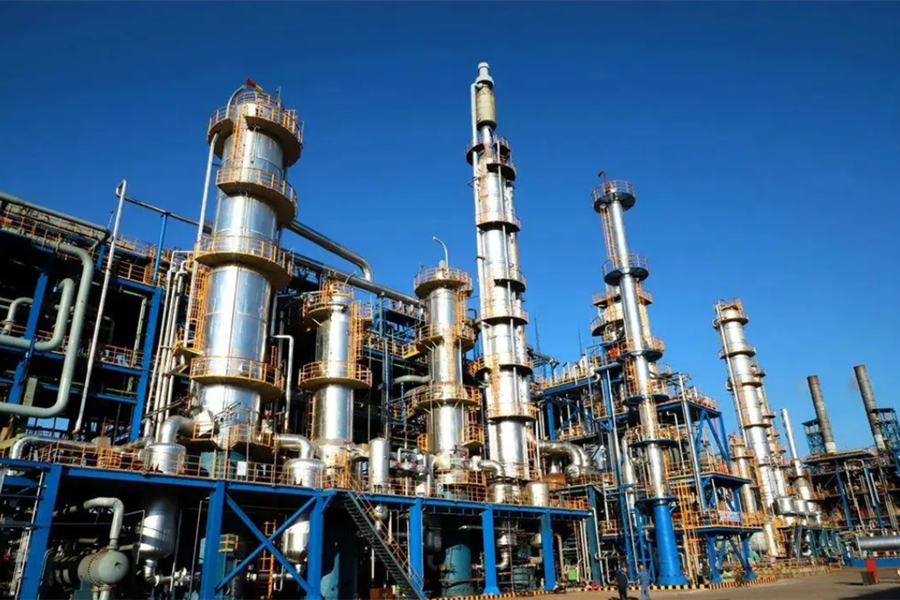Chlor-alkali industry is a chemical industry that produces chlorine gas and caustic soda by means of electrolytic salt aqueous solution. It has a history of more than 100 years and is also the earliest application of titanium in chemical industry. In chlor-alkali production, titanium equipment mainly includes metal anode electrolyzers, ion exchange membrane electrolyzers, tubular wet chlorine cooler, refined brine preheater, dechlorination towers, chlor-alkali cooling and washing tower, vacuum dechlorination pump and valve and other titanium equipment. It replaced graphite as the primary material in chlorine cooling scrubbers in the 1970s. Nowadays, titanium has been a widely used anti-corrosion material in the chlor-alkali industry, its superior corrosion resistance makes it ideal for making metal anodes and other processing equipment. Why? Why titanium is popular in this field? Let’s start with its character.
The characteristics of Titanium
Corrosion resistance is an important feature of the chlorine alkali industry. The process medium and corrosive substances such as sulfuric acid, chlorine gas, hydrochloric acid and caustic soda used in chlor-alkali industry will bring adverse effects to pipelines and devices. Therefore, the equipment and materials of chlor-alkali production put forward higher requirements for corrosion resistance. Titanium alloy has excellent corrosion resistance, high strength, lightweight and good stability so it is favored in chlor-alkali industry production.
Titanium is often used in extremely corrosive environments, and this makes it better suited than other metals for such applications, especially when they develop a passive oxide film on the surface. This film is composed of crystalline materials, which have high integrity and adherence. When a titanium alloy is damaged, the passive film heals itself. In addition, anodising is an effective process to enhance the protective film on titanium. It exhibits excellent corrosion resistance in seawater and hydrocarbons. In addition, titanium exhibits a strong passivation tendency, which means that it can form a stable oxidizing film in air or aqueous solution. Hence, the use of titanium alloys for chlorination processes can greatly benefit the industry. Titanium alloys also have excellent ductility, formability, strength, and weldability. Titanium has lower thermal conductivity than carbon steel and copper, so its walls can be thinner. Titanium’s good corrosion resistance also means that the surface is not susceptible to scaling, reducing thermal resistance. Moreover, titanium alloy is capable of being used at temperatures up to 600°C for a long time.
Under oxidizing conditions containing chloride, titanium exhibits corrosion resistance comparable to tantalum and superior to stainless steel and nickel-based alloys. The corrosion of 100% pure titanium is poor under the condition of reducing acid, while the titanium alloy containing palladium not only enhances the corrosion resistance of titanium under the condition of reducing medium, but also maintains its corrosion resistance under the condition of oxidation. It forms a passive oxide film on its surface, which improves its resistance to corrosion.

Applications of titanium in Chlorine Alkali Industry
- Metal anode
Chlor-alkali production processes include mercury electrolysis, diaphragm electrolysis and ion membrane electrolysis. In the past, graphite anode has been used for chlor-alkali anode. In 1956, the Dutchman Henry. H. Beer first proposed the use of metal anodes in membrane electrolyzer, also called Dimensionally Stable anodes (DSA), and obtained a patent right in 1965. Dimensionally stable anodes are electrodes coated with platinum group noble metal oxide on titanium substrates. In 1968, Italy’s DeNore company first realized the industrialization of titanium anode in chlor-alkali industry.
Since the 1970s, metal anode (DSA) electrolyzers and ion film electrolyzers began to replace graphite anode electrolyzers, and accordingly, graphite cooler was replaced by titanium wet chlorine cooler. The main equipment includes ion membrane electrolyzer, titanium anodic liquid circulation tank, light saltwater tank, vacuum dechlorination tower, heat exchanger, pipe and pump valve, etc. Titanium pipe and equipment are mainly used in anodic liquid circulation system, light saltwater systems, dechlorination systems, wet chlorine gas delivery systems and chlorine water circulation systems. A titanium pump is mainly used for conveying refined brine, anodic circulating liquid, light brine and chlorine water, etc. Compared with the graphite anode electrolytic cell, the diaphragm metal anode electrolytic cell can save 100-200 kW/h of electricity by producing 1t of caustic soda.
In the ion membrane electrolyzer, the temperature of anode and cathode chambers is about 90℃, the anode chamber filled with chlorine and salt solution and the cathode chamber has 30%-35% caustic soda solution. The operating current density is 30-40A /dm. Under such harsh conditions, the corrosion resistance of the material must be sufficient in the design of the electrolyzer. The anode part (anode and anodic liquid contact part) of ion film electrolyzer is mostly titanium alloy with good corrosion resistance. In addition to the main equipment electrolyzer, titanium equipment is mainly used in the following parts: brine system – liquid level gauge; Anodic liquid system – anodic liquid tank and chlorine washing tower; Fresh salt water system – dechlorination tower, fresh salt water distributor, instrument cooler; Sodium hypochlorite system – cooling, absorption tower, distributor; Chlorine gas system – wet chlorine gas cooler; Risk prevention system – heat exchanger, fan. - Wet chlorine gas cooler
When electrolytic salt produces caustic soda, a large amount of hot wet chlorine gas is produced, which can be used after cooling and drying treatment. There are two ways to cool hot and wet chlorine: direct water spraying and indirect cooling by tubular cooler. Direct cooling will not only produce a large amount of chlorine-containing chlorine water, pollution of the environment, and more chlorine loss, sulfuric acid consumption. The experimental results show that titanium is extremely resistant to corrosion at high temperature in the environment of wet chlorine gas, and its annual corrosion is 0.0025mm. Therefore, The use of titanium cooler Chlor-alkali industrial production can shorten the cooling and drying process, reduce the loss of chlorine gas and environmental pollution, and create favorable conditions for the stable operation of compressed gas and extreme drying. - Pump &valve
In the production of chlorine gas by membrane electrolysis and mercury electrolysis, pumps made of titanium alloys used in potassium hypochlorite and sodium hypochlorite are economical. Georgia-pifik Company uses a titanium pump to pump 85℃ salt solution, which contains 270~320g/L NaCl, NaCl crystallization and more than 0.5g/L free chlorine. The service life of titanium pump is up to 10 years.
Write in the last
We can say that titanium alloy has been the most preferred metal in the chlor-alkali industry. There are also some problems: First of all, different grades of titanium alloy differ in corrosion resistance and machining performance, etc., engineers should be based on the actual conditions, part location and whether the need for machining, etc. Generally, titanium does not produce intergranular and stress corrosion, but it is prone to crevice corrosion, especially the crevice with a width of about 0.5 mm. For those parts which are prone to corrosion, titanium palladium alloy or palladium plating is the best choice.
Although titanium is a corrosion-resistant metal, it is not suitable for all chemical corrosive media. Even for the same medium, its corrosion resistance is also related to the medium concentration and temperature. Titanium cannot be used in dry chlorine gas, because even if the temperature in a dry chlorine gas environment is below zero, there will be a relatively violent chemical reaction, generating huge heat, which may cause a fire. In order to ensure that titanium has good stability in chlorine gas, the water content of chlorine gas can not exceed 0.5%.


